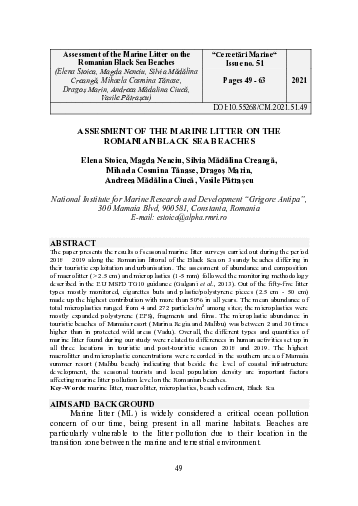Assessment of the Marine Litter on the Romanian Black Sea Beaches
DOI:
https://doi.org/10.55268/CM.2021.51.49Keywords:
marine litter, macrolitter, microplastics, beach sediment, Black SeaAbstract
The paper presents the results of seasonal marine litter surveys carried out during the period 2018 – 2019 along the Romanian littoral of the Black Sea on 3 sandy beaches differing in their touristic exploitation and urbanisation. The assessment of abundance and composition of macrolitter (> 2.5 cm) and microplastics (1-5 mm) followed the monitoring methodology described in the EU MSFD TG10 guidance (Galgani et al., 2013). Out of the fifty-five litter types mostly monitored, cigarettes buts and plastic/polystyrene pieces (2.5 cm - 50 cm) made up the highest contribution with more than 50% in all years. The mean abundance of total microplastics ranged from 4 and 272 particles/m2 among sites; the microplastics were mostly expanded polystyrene (EPS), fragments and films. The microplastic abundance in touristic beaches of Mamaia resort (Marina Regia and Malibu) was between 2 and 30 times higher than in protected wild areas (Vadu). Overall, the different types and quantities of marine litter found during our study were related to differences in human activities set up in all three locations in touristic and post-touristic season 2018 and 2019. The highest macrolitter and microplastic concentrations were recorded in the southern area of Mamaia summer resort (Malibu beach) indicating that beside the level of coastal infrastructure development, the seasonal tourists and local population density are important factors affecting marine litter pollution level on the Romanian beaches.

Downloads
Published
How to Cite
Issue
Section
License
This is an open access journal, which means that all content is freely available without charge to the user or his/her institution. Users are allowed to read, download, copy, distribute, print, search, or link to the full texts of the articles, or use them for any other lawful purpose, without asking prior permission from the publisher or the author. This is in accordance with the BOAI definition of open access.






